
There Will Be No War Between Iran and the United States
The editorial of Arman Daily predicts that no all-out war will break out between Iran and the United States and Israel.
After the war in Gaza and the escalation of tensions in the Middle East, which is always brimming with tensions, there is concern in society as to a possible war between Iran and the United States. There will be no war for the following reasons:
- Although Israel keeps taking measures and even conducts “terrorist” acts against Iran, it does not have the power or the courage to face Iran and will at most engage with Iran in third countries. This means that confrontations will be largely limited to security issues and psychological warfare.
- Until the presidential election in 2024, the United States will not engage in war with Iran, nor will it support Israel’s measures.
- Over the past 35 years, the Iranian leadership has never allowed Iran to engage in a war, even in the case of the killing of Iranian diplomats in Afghanistan when everything was ready for an all-out war. This anti-war policy is still strongly implemented.
- The Iranian republic suffers from a big historical-structural paradox which means having certain requirements for its survival both regionally and domestically.
For some decision-makers, normal and stable conditions in and out of the country seem boring, even dubious and fire under the ashes. This characteristic, which is the outcome of historical events, is one of the main obstacles in the development of Iran. Accordingly, Iran is always at a sensitive and decisive juncture.
But the other side of this paradox is the fact that the Iranian republic has always averted war, which is incidentally a very rational move. This policy within the structure of the Iranian republic will prevent the breakout of a war, but the crises will continue.
Until the Last Rial in People’s Pockets!
The editorial of Jahan Sanat raises questions about why the government and Parliament intend to raise taxes on ordinary citizens and seek to take away the Iranian people’s money to the last rial.
The so-called revolutionary 11th Parliament and the 13th popular government of Ebrahim Raisi, hand in hand, have coveted citizens’ money, and they want to take the last single rial of each citizen through taxation. How come these two branches of the establishment that are from the same political faction have heated arguments over a slight increase in government employee salaries, and yet they keep insisting on increasing taxation on capital gains, automobiles and houses? They are putting their hands into people’s pockets trying to get the last rial of citizens in the name of taxing the rich.
One reason is that there is a new strategy in using oil revenues, which leaves the government with no choice but to put its hand in people’s pockets to be able to pay for its expenses. The other reason is that the government knows very well that in the new Iranian year (starting March 21) and after the decline in oil revenues, the government must take money from the people to be able to stand on its feet. The other reason is that the government is trying to tell the poor that it is acting like Robin Hood, getting money from the rich and giving it to the poor.
Citizens who have earned their money by working hard will find ways to preserve their incomes and assets away from the government’s reach: they might move their assets abroad, the bribery of tax officers might increase, people might lose interest in earning higher incomes, etc.
On the other hand, citizens are entitled to ask where their tax money is spent, and which entities are benefitting from the taxes obtained from people by force. The governments administering countries through taxation are able to tell citizens where exactly the taxes are spent, while citizens can monitor how taxes are really expended. Will the 13th government — that is resolved to empty the pockets of citizens — do so?
Containing Tensions?
The editorial of Arman Melli reviews many issues that exist between the United States and Iran including the nuclear deal, Iran’s proxy groups and Iran’s policy toward Israel.
The United States has reportedly sent messages to Iran over different issues. It is said that the Americans have told Iran that they are not interested in the war spreading in the region and have called for resolving regional issues.
Obviously, these messages are double-edged: they contain positive points and convey other messages as well. This includes the fact that the continuation of tensions might lead to the spread of the war in the region. The Americans apparently seek to prevent the conflation of the conflict and limit it to Gaza because its spread will put US interests at risk and will be costly for the United States. Naturally, they are trying to stop the spread of the war in the region.
So they are trying to encourage Iran to prevent the spread of the war, in the sense that Iran-backed groups in the region, including resistance groups in Syria, Yemen and Iraq, would not take any measures that would provoke the Americans to react in a way that might result in the continuation of the cycle of endless conflict.
There are other unresolved issues between Iran and the United States and the Americans are interested in sending messages to Iran about them. These issues include the nuclear deal (JCPOA): the JCPOA is one of the outstanding issues between Iran and the United States in the context of US policies in the Middle East. There are several issues which are related to sanctions against Iran as well as US and EU policies toward Iran.
The most important issues include the JCPOA, Iran’s policy toward Israel and the Iran-backed militias that are acting against the United States and Israel in the region. Moreover, Iran’s position toward Russia’s war on Ukraine is another issue between the United States and Iran.
These issues have created tensions between Iran and the United States and if they are to be resolved, different measures must be taken. When Joe Biden took office, he said that he intended to go back to the JCPOA and use it for resolving other issues with Iran.
But now that the JCPOA is set aside, tensions in the Middle East are on the rise and the conflict between Palestine and Israel continues, the United States seeks to contain this war. It is only after this phase that other issues will be discussed.
Bells of War!
The editorial of Arman Melli explains why the region is threatened by war with tensions escalating everywhere.
After October 7, the situation in the region has become very complicated. So, it is foreseeable that in the future, another part of the region too might see the escalation of tensions. Some actors claim to have come to the region for defusing tensions, but their measures have backfired adding fuel to tensions in the region, even pushing it to the brink of war.
Some regional countries are trying to stop the escalation of the situation which makes conditions a little more flexible. However, as was said before, some measures still imply that the war will spread in the region.
Complex tensions in the region have the potential to turn into bigger problems, in the sense that any measure or incident might lead the region to a more critical situation.
Right now, there is potential for a bigger crisis in the region. Of course, those involved in this crisis are trying to manage the situation rationally. But it is not clear to what extent they will be able to control the situation or if they can do so to the end. Some incidents might lead to a new situation and might even impose a war on the region which will be to no one’s advantage.
It is possible to talk of a ceasefire under the current situation if one side has achieved its goal. For example, Tel Aviv might have become sure of stopping Hamas militarily. It is possible to have a ceasefire if a balance of power is reached which will then make it disadvantageous to both sides to continue with the current situation.
But none of the above-mentioned scenarios have taken place yet. So currently, we cannot talk of a possible ceasefire, and the further escalation of tensions in the region is not unlikely.

Iran’s Consul General in Jeddah Meets With the Emir of Madinah
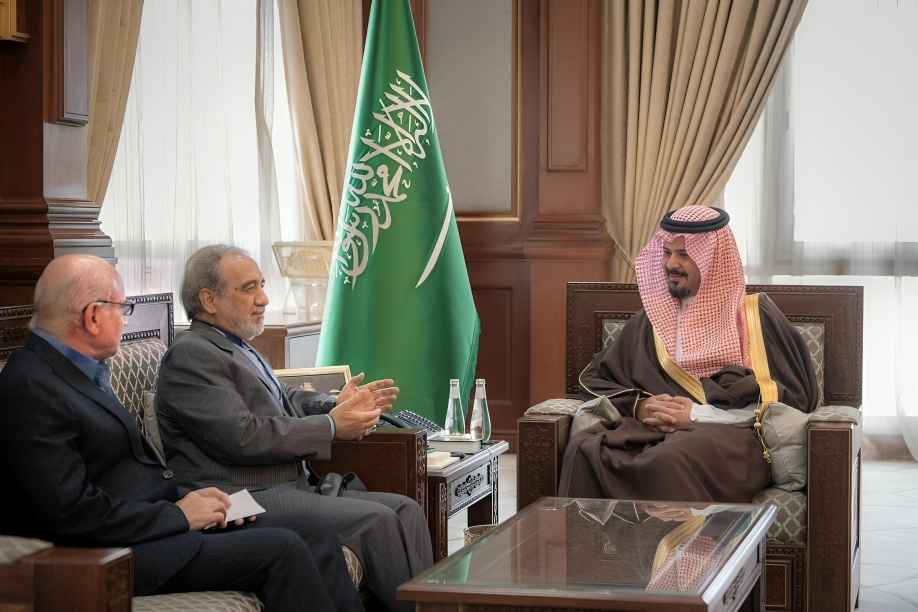
In a meeting held in the city of Madinah with the Emir of Madinah Prince Salman bin Sultan, Iran’s Consul General Hassan Zarnegar Abarghouee emphasized the necessity of developing bilateral relations in the region and the Islamic world based on the extensive capacities of Iran and Saudi Arabia.
He also underscored the necessity of developing economic-trade relations and direct trade, while announcing Iran’s readiness for enhancing commercial relations.
Abarghouee also pointed to the Iranian people’s enthusiasm for undertaking pilgrimages to Saudi Arabia.
In this meeting, the emir of Madinah underlined the approach of both countries’ senior officials to developing relations while highlighting that the Kingdom of Saudi Arabia proudly offers different services to Hajj pilgrims.
Execution of Four Kurdish Political Prisoners
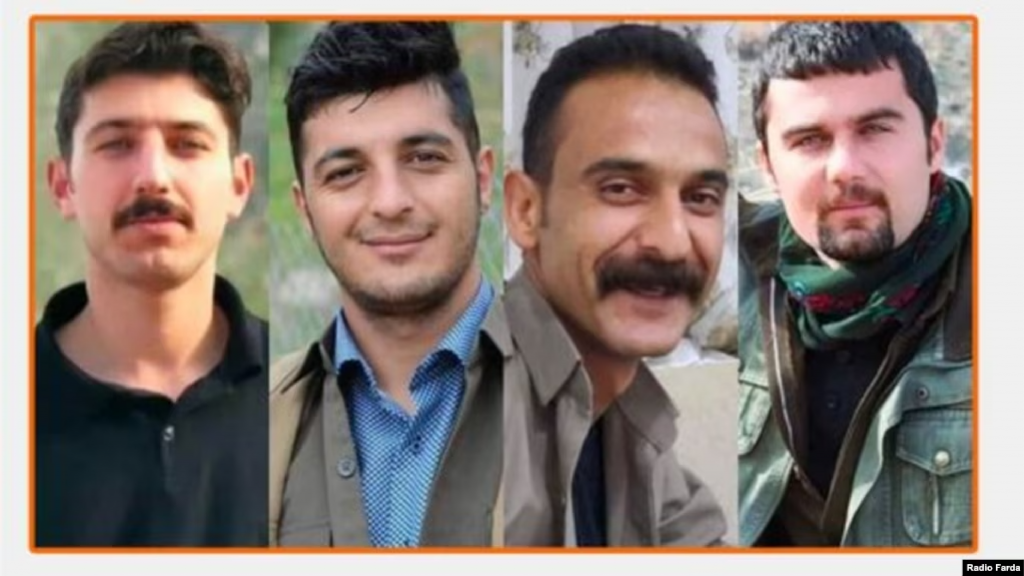
Despite the demands of human rights organizations for halting the implementation of execution sentences of four Kurdish political prisoners, Iranian judiciary-affiliated media outlet Mizan announced that on Monday, at dawn, Mohammad Faramarzi, Mohssen Mazloum, Vafa Azarbar and Pezhman Fatehi were executed.
Mizan claimed that these four individuals intended to plant bombs in the central city of Isfahan, but were arrested by security forces a few days prior to carrying out the operation.
IRGC-affiliated media simultaneously released propaganda footage against the executed prisoners.
Mohammad Faramarzi, Mohssen Mazloum, Vafa Azarbar and Pezhman Fatehi were arrested in western Iran in the summer of 2022.
Their families reject the charges, while human rights organizations point to the fact that all judicial procedures were conducted secretly, calling these executions unfair.
The families of those executed met with them in Evin prison on Sunday and the prisoners were then taken to Ghezelhessar prison for implementing the death sentences.
The execution of these four individuals invoked widespread outrage among political and civil activists and human rights organizations.
Reza Pahlavi, son of Iran’s former shah, warned that “the Islamic Republic has announced war against Iranian people and the world simultaneously” pointing to the execution of four political prisoners and the recent killing of three American soldiers in the attack by an Iran-backed militia in Jordan.
A number of other Iranian opposition figures, including Hamed Esmaeilion, Nazanin Bonyadi and Massih Alinejad, also strongly condemned the execution of these four Kurdish political prisoners.
Abdollah Mohtadi, secretary general of the Kurdistan Komalah party, confirmed the execution of four members of this party, saying that “Kurdistan will not remain silent in the face of slaughtering its children.”
Dire Economic Conditions, Destroyed Livelihoods Spark Protests in Iran
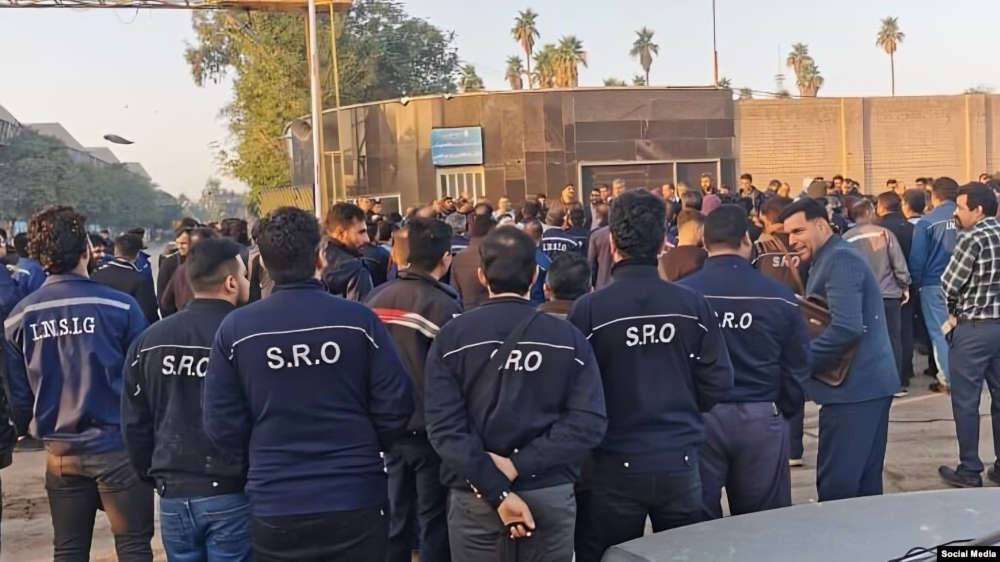
Several Iranian cities have been witnessing large protests staged by frustrated people who can neither gain nor secure their livelihood in a country whose leaders neither care about their issues nor are capable enough to resolve them.
A significant number of workers of Iran National Steel Industrial Group went on strike for several days in a row, staging assemblies in the southern city of Ahvaz. In recent months, dozens of workers have been laid off after protesting against the non-enforcement of the “job classification plan.”
After holding an assembly in front of the Khuzestan governor’s office and the central building of Melli Bank, the workers started to march in the streets chanting slogans.
Video clips on social media show workers shouting, “We didn’t see any justice, we won’t vote anymore,” “We will fight against oppression” and “Our enemy is here, they lie when saying it is America.”
Meanwhile, a number of retirees of the Telecommunication Company of Iran staged protests in Tehran, Orumieh, Esfahan, Kermanshah, Zanjan, Khoramabad, Shiraz, Sanandaj, Rasht and Bandar Abbas.
They chanted, “One less embezzlement and our problem will be solved!” In Ardebil, the retirees lambasted the IRGC’s dominance over Iran’s economy, chanting, “Instead of a qualified person, a military man is in charge.”
Moreover, a number of fraud victims of Amitis Company gathered in front of the judiciary chief’s office in Tehran. The prime suspect of a fraud case in this company has been arrested but, according to Iran’s state media, “managed to free himself from prison by a trick and flee the country.”
The defrauded people participating in this assembly expressed their rage by chanting, “What kind of a justice is this? The defrauder has fled from jail!” It is notable that 10,000 individuals have lost their savings in this case.
Khamenei Calls for Halt in Liquidity Growth in Iran
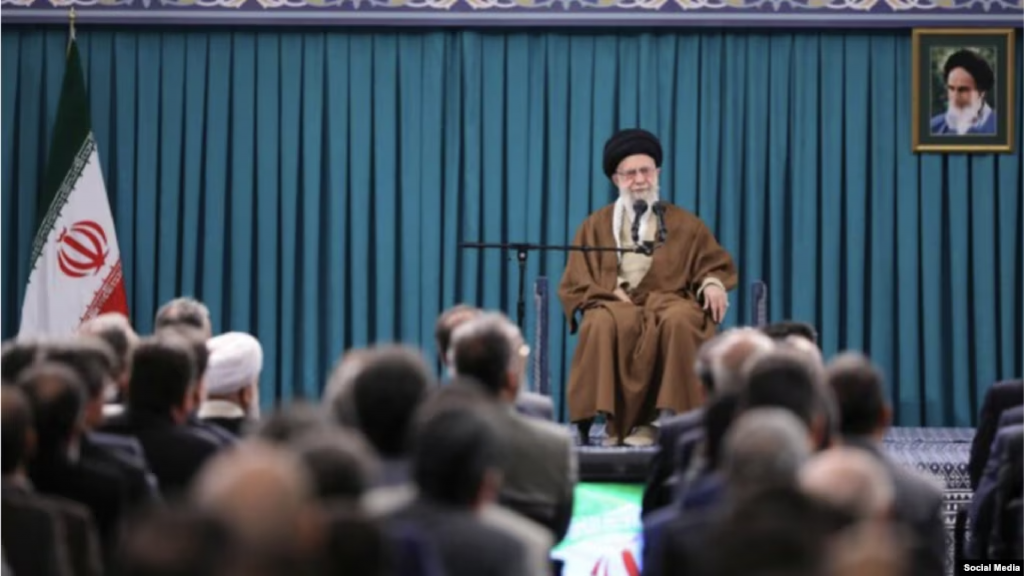
Iranian Supreme Leader Ali Khamenei in his meeting with economic actors called for a halt or decrease in liquidity growth in Iran, alleging that producers’ dissatisfaction shows that the government has not acted in accordance with his “reminders” last year.
In this meeting in which roughly 1,000 economic actors were present, Khamenei said that the obstacles within the government which have been created for businesses must be removed through decisions made by the Iranian president and his vice president.
He did not mention the details of his “reminders” to Ebrahim Raisi’s government last year.
The Iranian supreme leader’s views regarding controlling the liquidity level come at a time when the price of the dollar has skyrocketed in the unofficial market, surpassing 59,000 tomans per dollar.
The value of Iran’s national currency has dropped by 15% since Hamas’ attack on Israel on October 7.
Iranian officials and state-affiliated media had promised that with the de-escalation of turmoil in the region, the price of forex would decrease in Iran. But due to the escalation of tensions, the price of forex continues to soar.
Unleashed growth in liquidity has been one of the important factors in the rise in the inflation rate.
According to Iran’s Central Bank, the level of liquidity reached 7,177,000 billion tomans last fall.
The Iranian supreme leader also called for resolving the existing issues between the public and private sectors, saying that the restrictions created for the private sector are the outcomes of the sanctions on Iran and the shortcomings of previous governments.
Iran Launched Three Satellites Into Space Despite Western Countries’ Criticisms
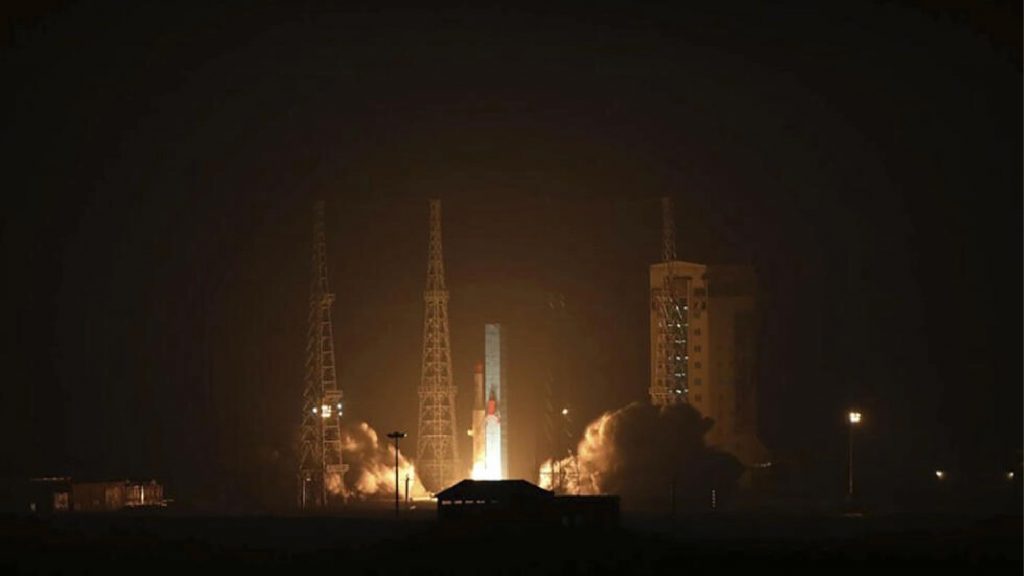
Iranian media announced on Sunday that for the first time three Iranian satellites were launched into space with a satellite carrier called Simorgh.
Analyzing the images released by Iranian state television shows that the launch was from the Imam Khomeini Space Launch Terminal in Semnan Province.
The Simorgh satellite carrier, built by the Iranian Defense Ministry, which had failed several times before, is a two-stage missile which uses liquid fuel and is designed for placing satellites in low Earth orbit.
Tehran took this measure while the rising tensions in the Middle East over the Hamas-Israel war have sparked fears over the possibility of a widespread regional conflict. The United States maintains that developing satellite carriers helps the Iranian republic to advance its long-range missile program which uses the same technology.
During the tenure of former President Hassan Rouhani, the Iranian government had slowed down its space program, scared that it might escalate tensions with the West. After the US withdrawal from the nuclear deal, however, tensions have escalated.
The United States, which considers the launch of satellites by Iran as a violation of UN Security Council resolutions, had earlier asked Tehran to stop any activities regarding ballistic missiles capable of carrying nuclear weapons.
In the meantime, the European troika condemned the recent launch of the Soraya satellite by Iran carried out a week before Simorgh.
The UK, France and Germany, as European members of the West’s nuclear deal with Iran (JCPOA), issued a statement to censure the launch of the Soraya satellite by the Iranian government.
In the statement, it is highlighted that the Ghaem 100 missile — which was used for launching Soraya — utilizes Iran’s long-range ballistic missile technology.
The statement clarifies that the Iranian republic continues to develop its missile program, despite UN resolutions against Iran and the global community’s call for halting it.
In the statement, it is underscored that such launches allow Iran to test its technologies which can be used for developing its ballistic missile program and is a threat to regional and international security.
